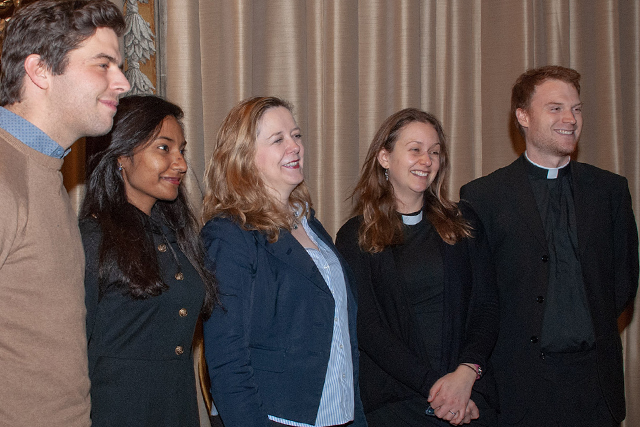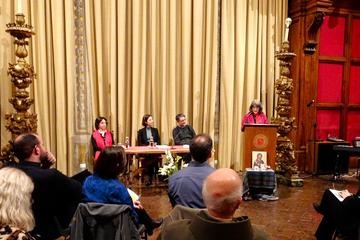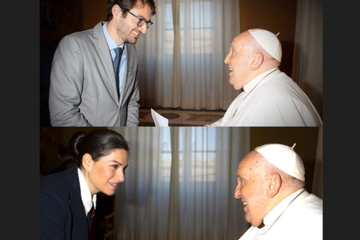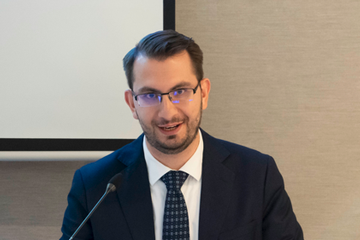
By Elena Dini
ROME — The beautiful main hall of the Centro Pro Unione was full Jan. 24 for the event co-organized by The Lay Centre and Centro Pro Unione for the Week of Prayer for Christian Unity. The main speaker was Anglican Biblical scholar Paula Gooder.
Dr. Gooder shared her insights on ecumenical dialogue, based on the account in the Gospel of Luke of the disciples on their way to Emmaus. The evangelist helps the reader to understand how tangible the disciples’ disappointment is, she said.
“They are returning miserable back home because their expectations were not met,” she said.
Dr. Gooder invited participants to relate this experience to what is happening currently in the field of ecumenical dialogue.
“In my childhood and youth, the ecumenical world was full of hope. Ecumenical commissions, such as the Anglican-Roman Catholic International Committee, on which I serve, produced groundbreaking reports. Sadly now, ecumenism is no longer in fashion and we might feel tempted to be disillusioned,” she said.
Like the disciples on the way to Emmaus, when people want situations to meet their expectations, they prevent themselves from seeing the good that is happening.
“We are challenged to ask ourselves what we are missing, what God is doing right in our midst that is not meeting our expectations,” she said.
Dr. Gooder invited her audience to think about what happened in the encounter between the disciples and Jesus and how he unpacked Scripture for them.
“Relations are transformed when we read Scriptures together,” she said. “This will change our journey together and we have to seek ways to engage youth in this endeavour.”
The next step, as in the Biblical story, is hospitality: this is what lies at the heart of ecumenism, she continued.
After Dr. Gooder’s presentation, two young adults shared their testimonies about how ecumenism deeply touched their lives and how it could touch other young people.
Hureem Salas, originally from Pakistan, now lives in Rome. Though Anglican, she received her education in a Catholic school. She spoke about how she was touched by Pope Francis’ visit to the Anglican Church of All Saints in Rome in 2017, at which she was present, and the first time an Anglican Choral Evensong was celebrated at the altar of the Chair of St. Peter in St. Peter’s Basilica. Salas shared as well the blessings she has experienced through an ecumenical Bible study group she attends.
“It revives us spiritually, which helps us to serve more effectively in our individual churches,” she said.
Paul Geck, a Protestant German student of theology at the University of Heidelberg, shared his experience of ecumenical encounters in Rome. Thanks to a friend at the university in Rome and to the Augustinian nuns at the Monastery of Santi Quattro Coronati, he said he realized how much Christians are the same but also how they are different.
“I felt interrogated by everything. And so my curiosity led me right into a process of what they call here a vocational discernment, something I have deeply missed in my own training,” said Geck, who is preparing to become a pastor.
“The thing about ecumenical encounters, as I found out, is it that they can change you,” Geck summed up, confessing how happy and grateful he is for such encounters.
The evening continued with an Ecumenical Celebration of the Word, presided by Rev. Olivia Maxfield-Coote.
“How we love the Lord is different, but Who we love is the same,” said Rev. Sebastian Harries, who delivered the sermon. Rev. Harries is the chaplain of St Gabriel’s College, a school of the Church of England in the United Kingdom. He is also an alumnus of The Lay Centre.


